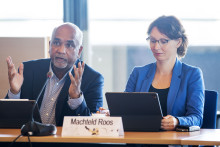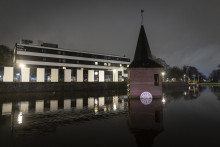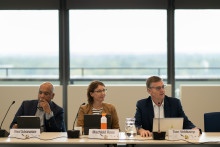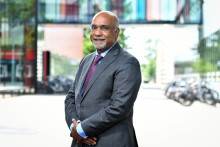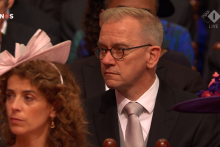Over the summer, you outlined three medium-term scenarios . Minister Bruins announced last week that the government has no doubts about the cuts, which will continue. Does that mean that the best-case scenario is out of the question?
Subramaniam: 'That's putting it a bit too simply, because the devil is in the details when it comes to these cutbacks. Will they take effect January 1, 2025? A year later? And with what instruments? If the minister succeeds in mitigating the effects, it could make a huge difference, but we don't know what will happen. That's why Budget Day (in Dutch known as Prinsjesdag, ed.) is crucial.'
Roos: 'We talk a lot with the ministry, but we don't know the details yet. The figures are known, the goals are clear and we have said this: we are drawing up the budget for 2025 based on what we know. But there is a sword of Damocles hanging over our heads. That will have an effect, but it is unclear how much and where.'
Subramaniam: 'There is also a sword of Damocles hanging over development cooperation, which could have an effect on our ITC faculty (which is largely financed from the government's development cooperation funds, ed.). But we don't know that yet either. The extent of the cut is clear at one billion euros, but where and when it will land? The timing is very important.'
'The administrative agreement is a heavy and clear document, with signatures underneath. This cannot be unilaterally dismissed' - Machteld Roos
Fellow board members called for action during the OAY last week. The word strike was even mentioned. There are also voices about taking legal action, because the government is unilaterally breaking the administrative agreement. What are you willing to do?
Subramaniam: 'We fully support that. We are combative. I've been saying for years that there's one investment that has sky-high returns: education. This cut is reckless, unprecedented and disproportionate, said Edith Hooge of the University of Amsterdam recently. As universities, we are certainly exploring legal action, because the administrative agreement has been unilaterally broken open. The time for obedient negotiations is over.'
Roos: 'At the same time, we are still in close talks with the minister and his officials, both from the UT and from UNL, but the administrative agreement is a heavy and clear document, with signatures underneath. This cannot be unilaterally dismissed. We make it clear that this is not possible and try to limit the cuts that are coming, so that we can maintain what is good.'
Can the Executive Board do anything about the government's plans for higher education at this stage, or is it now accepting, acting and looking forward to Budget Day?
Subramaniam: 'We are still talking and – like at the OAY – we are making ourselves heard. A lot is still happening, as presidents of the Executive Board, we have agreed to invite the minister for a principled discussion, and there is a lot of talk at the ministry. We don't want to go into details without first putting our principles on the table: what kind of country do we want to be? With what kind of education? We will know more on Budget Day, but even then not everything is in place. As far as internationalisation legislation is concerned, we are waiting for the Council of State, general considerations, motions and amendments will follow, and the entire House has something to say about it. We have to make good use of that time.'

UT President Vinod Subramaniam during last week's Opening of the Academic Year.
Then to the UT: has a programme manager for organisational changes already been appointed? And what will his or her mandate be?
Roos: 'That appointment will follow very soon, that's coming. This person will be directly subordinate to the Executive Board and, together with the programme team, will supervise and drive the process of cutbacks. The Spring Memorandum – within which the units work – is the framework. This makes it clear what remains at the bottom line. Those figures are clear: this year minus two percent on the first flow of money, next year minus one and in 2026 zero.'
The Science & Technology faculty announced a reorganisation last Friday. Is it to be expected that other units will soon follow suit?
Subramaniam: 'I don't want to get ahead of things. Before we have a budget and all the plans are clear, we are a few weeks down the road. And then Budget Day comes in between, which gives us more information to focus on. Our hope, of course, is to remain financially healthy without too drastic measures, but I do not know whether that is feasible.
It is a tough and courageous decision by the Faculty Board of Science & Technology. Unfortunately, there was no other option for S&T. As the Executive Board, we are in close contact with the Faculty Board and provide support where necessary. A reorganisation is hugely drastic for everyone. It is important that this is done carefully and transparently and that employees are well informed. There are good agreements about this at the UT.'
A meeting with the University Council is scheduled for October 2 about the plans of all units. Will there be more clarity?
Subramaniam: 'Even then, we still have to talk to the local participation bodies and the community. On October 2nd, we will have – I think – a picture that is not quite complete yet. But then we do have a picture that gives direction: will it be limited to just a reorganisation at S&T, will it be more units, or will it be larger? We then have to do that integral consideration.'
Acute measures were also announced in the summer, including a stop to student assistants. Are such measures enough to straighten out the UT's financial health this year?
Roos: 'Some measures have an immediate effect, such as a stop to external hiring. This measure is a tightening of the package as we announced it in the autumn of 2023. Fortunately, the moment you stop all kinds of out-of-pocket costs, you will see results quickly. We see movements that are moving in the right direction. But we won't see what the effect will be until the next management report that will be published soon.'
Wouldn't an acute stop on student assistants have a major impact on education?
Roos: 'The measure came into effect immediately last July, so everyone had to get to grips with it. Of course, the moment you can no longer deploy those people where you used to, you start to notice that and you have to organise your education differently.'
'You can still keep the personal touch, while we streamline education more' - Vinod Subramaniam
Subramaniam: 'There is also a reason why we have given exceptions. But we leave it to the faculty boards and service directors to determine those exceptions. Our expectation is that this will be looked at critically – and we hear from deans that they take that seriously.'
Nevertheless, there are concerns within the organization about the feasibility of such a measure.
Roos: 'It is very understandable that it is a puzzle to organise education differently. We also received – and answered – many questions about it. Ensuring that we as an organization can operate more effectively, efficiently and cost-consciously, while maintaining the quality of our primary process, that is the key. As a university, we are known for our personal approach, but the risk is that this personal approach can be translated into a lot of customization. We've seen that takes a lot of time and money.'
Subramaniam: 'You can still keep the personal touch, while we streamline education more. One does not mean that the other has to be lost. Finding the balance in this, that's the crux.'

UT vice president Machteld Roos. Photo: Eric Brinkhorst.
Then there are the so-called 'building blocks' – the austerity measures. Is it true that the number has been reduced?
Roos: 'A number of building blocks have been completed due to a short lead time, others have become an acute measure. We have mainly clustered the remaining building blocks more. That was to create an overview, because we heard that the number of twenty was quite high. That is why they are now more clustered around, for example, education, research and valorisation and supporting processes. That also helps us in communicating about this.'
One austerity measure focuses on 'the merging and downsizing of interfaculty units' (DesignLab, Robotics Centre, TGS, Pre-U, Fraunhofer). Should they, like ATLAS, fear for their future?
Subramaniam: 'You have to look at the content first and then at the form. What we are working on is the question: where are the synergies in the interfaculty units? We must ensure that the sum of the parts is greater than the individual parts. If you ask them if they should fear for their future, it sounds like they're not doing good things. While they're doing all that.'
Roos: 'What applies to everyone, including the interfaculty units, is that there is a cost-cutting task. As Strategic Board, we are discussing this and looking at it from an integral, bigger picture. We are looking at how we can make efficiency gains in the interfaculty units. That conversation is now being held.'
Now that next year's budget is in the works, is there anything to be said about objectives and targets?
Roos: A maximum deficit of one percent on the first flow of money, we will stick to that. All units are now busy with their internal budget process and we are discussing the overall picture. Everyone knows how each other is doing and what challenges lie ahead.'
Subramaniam: 'That's extremely important. I will keep on shouting my voice hoarse: we're in this together. And that's what happens. Everyone has collectively come to the conclusion that it is a budget of give and take. That does not alter the fact that it is difficult, that we have to work hard and that difficult decisions are going to be made. But the basic attitude – we are trying to solve this together – that is a great good.'


